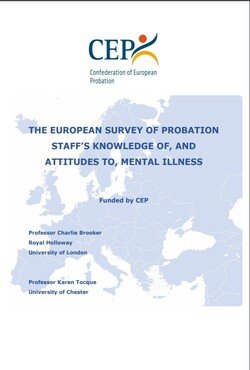By Kristen M. Zgoba, Rusty Reeves, Anthony Tamburello and Lisa Debilio
The relative contributions of mental illness and substance use disorders to criminal recidivism have important clinical and policy implications. This study reviewed 36 months of postrelease data for nearly 10,000 New Jersey state inmates released in 2013 to ascertain the rearrest rate of those diagnosed with mental illness, substance use disorders, both, or neither. We also examined whether certain characteristics suggestive of higher risk of psychiatric decompensation were associated with higher rates of rearrest. Released inmates who were diagnosed with a substance use disorder (without a mental illness) while incarcerated had the highest rate of rearrest upon release, followed by inmates diagnosed with both mental illness and substance use disorder together, inmates with neither a substance use disorder nor a mental illness, and lastly by inmates diagnosed with mental illness alone. These differences were statistically significant only between inmates with substance use disorders and those without a substance use disorder. Among those with a diagnosed mental disorder, there were no statistically significant differences in recidivism based on diagnosis or based on prescription of antipsychotic medication, injectable antipsychotic medication, or involuntary antipsychotic medication. These results support correctional institutions assertively addressing substance use disorders, especially for individuals returning to the community.
Approximately 2.2 million people, or nearly 1 percent of the United States population, were incarcerated in jails or prisons at the end of 2016.1 The vast majority of these individuals, nearly 97 percent, are expected to eventually return to the community.2 More than two thirds (68%) of persons released from prison will be rearrested within the first three years of release, and 83 percent will be returned to the criminal justice system within nine years of release.3 The societal and financial costs of incarceration and recidivism are burdensome.4 Thus, measuring and reducing recidivism is a high priority for most departments of corrections.5
Research indicates that former inmates with mental illness recidivate at a rate similar to undifferentiated offenders, though inmates with substance use disorders recidivate at a higher rate than undifferentiated offenders. Inmates with both mental illness and substance use disorder recidivate at an even higher rate. Additionally, persons with serious mental illness, such as schizophrenia and bipolar disorder, tend to have higher recidivism rates than those with other psychiatric disorders. The matter is complex, however, because other criminogenic factors, such as hostility, impulsivity, and antisocial attitudes and peers, may better account for crime among both those with and without mental illness diagnoses. Moreover, the effort to disentangle mental illness, substance abuse, and other criminogenic factors in the relationship to crime is nothing new. Most famously, the MacArthur Violence Risk Assessment Study, conducted between 1992 and 1995, explored the relationship between mental illness and violence, and the implications of that study continued to be debated for years after the conclusion of the study.19
Evidence suggests that better engagement in treatment for persons with mental illness on reentry does reduce the risk of committing a serious crime. Participation in mental health court reduces the risk of violent offending for justice-involved individuals with mental illness.20 Mela and Depiang reported that clozapine delayed the time to reoffending for former inmates prescribed an antipsychotic medication.21 More broadly, routine outpatient treatment, including medication, reduces the likelihood of arrest among persons with severe mental illness.
Notwithstanding the study by Mela and Depiang, little research has been done to consider the effects on recidivism of being prescribed an antipsychotic medication in prison, being prescribed injectable antipsychotic medication, or being prescribed medication involuntarily during incarceration. In the Clinical Antipsychotic Trials of Intervention Effectiveness (CATIE), nearly 75 percent of the patients discontinued their medications during the 18 months of the study. CATIE confirmed what psychiatrists already knew: that nonadherence with antipsychotic medication is the norm rather than the exception. In turn, such disengagement from treatment may contribute to incarceration among those diagnosed with severe mental illness.25 Supporting this concern, a prospective study from the United Kingdom reported a higher rate of violence in released prisoners with untreated schizophrenia. There is no reason to suspect that offenders with mental illness prescribed antipsychotic medication are any more likely to take their medication upon release than other individuals with mental illness in the community. Thus, the prescription of antipsychotic medication itself in prison may predict criminal recidivism.
Research suggests that long-acting injectable antipsychotic medications reduce nonadherence and hospital recidivism.27 In our experience, however, an inmate patient for whom long-acting injectable or involuntary antipsychotic medications are prescribed may represent an even greater risk of crime upon release than those for whom voluntary oral antipsychotic medications are prescribed in prison. In the New Jersey Department of Corrections (NJDOC), patients are usually prescribed long-acting injectable antipsychotic medication due to histories of nonadherence with oral medication, and these patients also often have histories of dangerousness associated with mental illness. Furthermore, inmate patients prone to nonadherence are often prescribed the medication involuntarily (on a long-term, non-emergency basis). Thus, we suspected that upon leaving prison, patients who had been prescribed injectable or involuntary treatment would stop taking their medications in the community, become symptomatic, and pose an increased risk for criminal recidivism.
In this study, consistent with the scientific literature, we hypothesized that the three-year recidivism rate of offenders with a mental illness, but not a substance use disorder, would be similar to the rate of offenders with neither problem; that the three-year recidivism rate of offenders with a substance use disorder would be higher than the rates of offenders without a substance use disorder, and of those with a mental illness alone; and that the three-year recidivism rate of offenders with both a mental illness and a substance use disorder would be higher than any of the other three groups. Among the group of offenders diagnosed with mental disorders, we hypothesized that, relative to other offenders with an identified mental illness, three-year recidivism rates would be higher among those with a psychotic disorder or a mood disorder diagnosis, those prescribed an antipsychotic medication upon release, those prescribed a long-acting injectable antipsychotic medication upon release, and those prescribed involuntary medication upon release.
Journal of the American Academy of Psychiatry and the Law Online February 2020, 7p.









